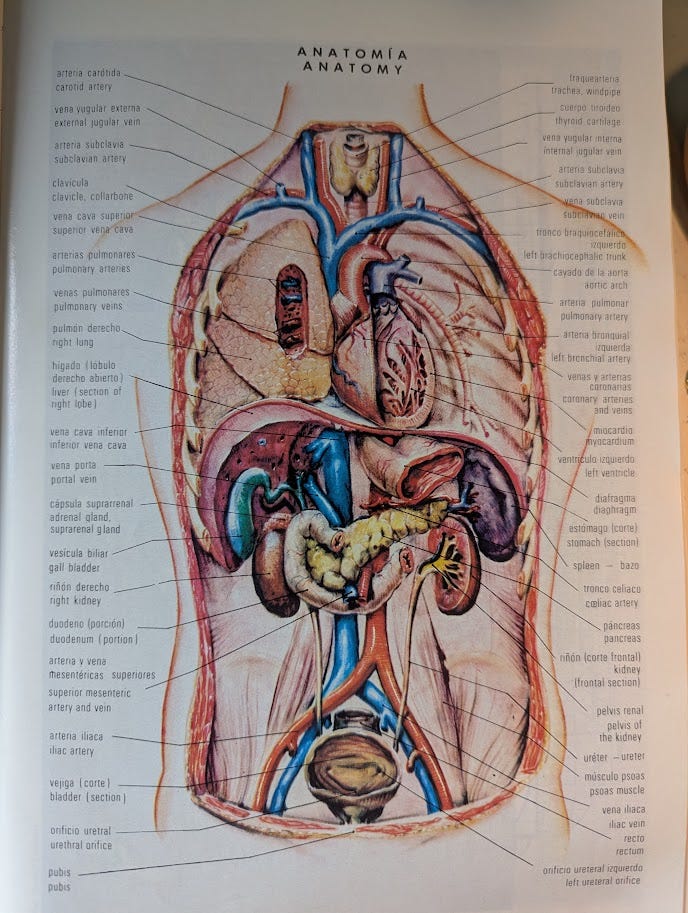
I’ve been making my way through all the seasons of “Grey’s Anatomy” on Netflix these past few months, and while I always look away during the gruesome parts, watching it often reminds me of my teaching years. When some of my advanced Spanish students would opt to take the Anatomy and Physiology (A&P) class, they’d often come to my class exclaiming about the useful overlap of the two subjects because so much of the terminology in that science class is comprised of cognates of words they’d already learned from me or of ones that would come up later in my class because the words all came from Latin.
anatomy — there are many definitions for this word, but let’s just say it’s a “branch of the biological sciences that deals with the structure of organisms” and for the purposes of this post, that organism is the human body.
anatomía — the Spanish cognate of the same meaning/s
The obsolete definition of “anatomy” is “a body dissected or to be dissected” and that is because the Latin anatomia means “dissection.” To learn about the structure of the human body, to study its “anatomy,” we do need to look inside, and the only way to do that is through dissection, so from that original meaning and use of the word, it evolved to its current meaning and many others — one of those meanings is essentially “the art of dissection.”
Here are some of the common Spanish cognate anatomical terms. See if you can figure them out — I’m sure you can.
arteria
vena
pulmonar
músculo
diafragma
estόmago
clavícula
bronquial
miocardio
duodeno
páncreas
uréter
I could go on and on, and I certainly didn’t teach all of these words in my Spanish class, but I did cover “pulmόn” for “lung” and “estόmago” for “stomach” during my body parts lessons. “Músculo” for “muscle” tended to come up in the exercise sections of the vocabulary lessons.
It’s useful for anyone who wants to be a doctor to have a working knowledge of Latin since so many of the words associated with the body come from that language. That’s a very difficult language to master and isn’t offered in many high schools across the country, so the next best choice is to study a language that came from Latin. Spanish, of course, is a great option and the one you’ll find offered in most high schools. Italian, with its roots firmly planted in the heart of what was the Roman Empire, is probably a better option, but it’s not commonly taught in high schools in the United States.
If I take that same list of Spanish cognates from above and put them in Italian, we get these:
arteria
vena
polmonare
muscolo
diaframma
stomaco
clavicola
bronchiale
miocardio
duodeno
pancreas
uretere
You can see that some of these are the same as they are in Spanish, and one is the same as we use in English. The beauty of cognates at work, making learning all those medical terms just a little easier for those who have studied Latin, Spanish, Italian, or another Romance language.
And if you find yourself in a Spanish-speaking country and in need of medical attention, you just might be able to pick up a little of what you hear the medical staff saying about you, or you might be able to explain a few things yourself.
Here is a photo from my old Spanish-English dictionary. Check your guesses about the words I listed above and look for other cognates or words you might recognize.
This is the 208th post of “Cognate Cognizance,” I believe, and I would like to hear from you. I’ve tried offering weekly posts to my many free subscribers and including extra information for the few paying subscribers, and I’ve tried offering only monthly posts to my free subscribers and weekly posts to the paying ones — only the paying subscribers have access to the audio versions no matter how often I send out the posts, and paying subscribers have full access to all 207 previous archived posts.
So, would you, as a free subscriber, prefer to receive weekly posts with extra information for the paying subscribers, or do you prefer just to receive monthly posts like this one? Please comment or send me a message. Thanks.
Paying subscribers can comment or message me, too, and let me know if there’s anything else you’d care to learn about Spanish and Italian cognates from me. I have the option to offer video recordings instead of audio, too, so let me know if that’s something you’d like me to try.
Thanks for being here.
Until next time.
Tammy Marshall













